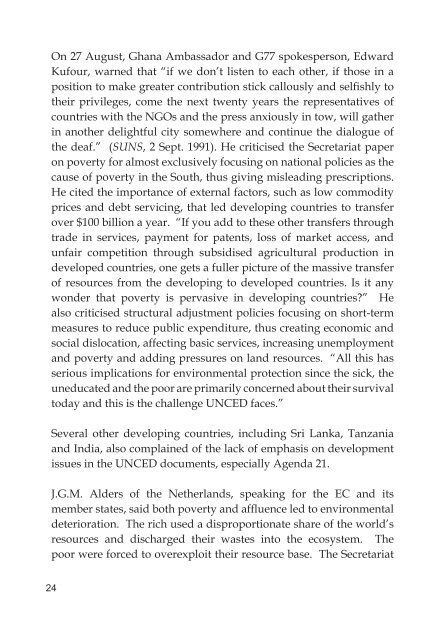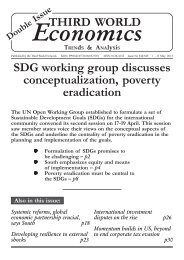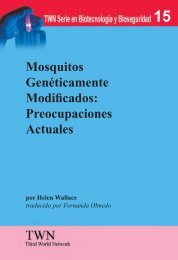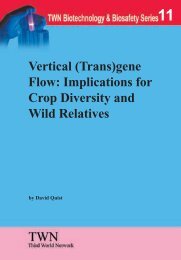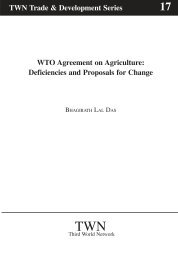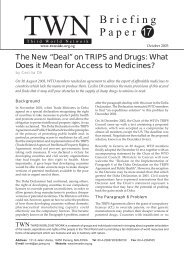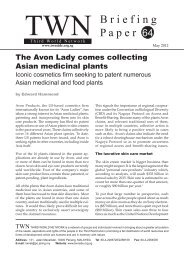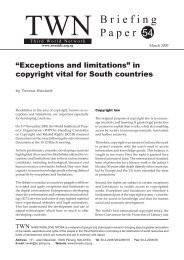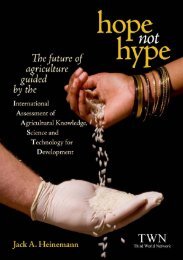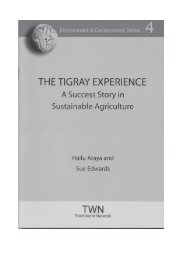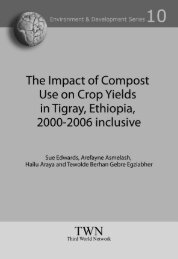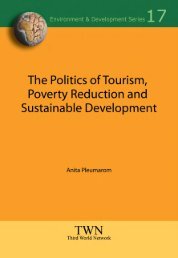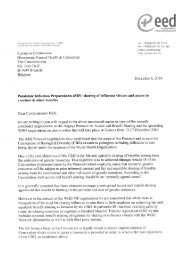Reaffirming the Environment-Development Nexus of UNCED 1992
Reaffirming the Environment-Development Nexus of UNCED 1992
Reaffirming the Environment-Development Nexus of UNCED 1992
Create successful ePaper yourself
Turn your PDF publications into a flip-book with our unique Google optimized e-Paper software.
On 27 August, Ghana Ambassador and G77 spokesperson, EdwardKufour, warned that “if we don’t listen to each o<strong>the</strong>r, if those in aposition to make greater contribution stick callously and selfishly to<strong>the</strong>ir privileges, come <strong>the</strong> next twenty years <strong>the</strong> representatives <strong>of</strong>countries with <strong>the</strong> NGOs and <strong>the</strong> press anxiously in tow, will ga<strong>the</strong>rin ano<strong>the</strong>r delightful city somewhere and continue <strong>the</strong> dialogue <strong>of</strong><strong>the</strong> deaf.” (SUNS, 2 Sept. 1991). He criticised <strong>the</strong> Secretariat paperon poverty for almost exclusively focusing on national policies as <strong>the</strong>cause <strong>of</strong> poverty in <strong>the</strong> South, thus giving misleading prescriptions.He cited <strong>the</strong> importance <strong>of</strong> external factors, such as low commodityprices and debt servicing, that led developing countries to transferover $100 billion a year. “If you add to <strong>the</strong>se o<strong>the</strong>r transfers throughtrade in services, payment for patents, loss <strong>of</strong> market access, andunfair competition through subsidised agricultural production indeveloped countries, one gets a fuller picture <strong>of</strong> <strong>the</strong> massive transfer<strong>of</strong> resources from <strong>the</strong> developing to developed countries. Is it anywonder that poverty is pervasive in developing countries?” Healso criticised structural adjustment policies focusing on short-termmeasures to reduce public expenditure, thus creating economic andsocial dislocation, affecting basic services, increasing unemploymentand poverty and adding pressures on land resources. “All this hasserious implications for environmental protection since <strong>the</strong> sick, <strong>the</strong>uneducated and <strong>the</strong> poor are primarily concerned about <strong>the</strong>ir survivaltoday and this is <strong>the</strong> challenge <strong>UNCED</strong> faces.”Several o<strong>the</strong>r developing countries, including Sri Lanka, Tanzaniaand India, also complained <strong>of</strong> <strong>the</strong> lack <strong>of</strong> emphasis on developmentissues in <strong>the</strong> <strong>UNCED</strong> documents, especially Agenda 21.J.G.M. Alders <strong>of</strong> <strong>the</strong> Ne<strong>the</strong>rlands, speaking for <strong>the</strong> EC and itsmember states, said both poverty and affluence led to environmentaldeterioration. The rich used a disproportionate share <strong>of</strong> <strong>the</strong> world’sresources and discharged <strong>the</strong>ir wastes into <strong>the</strong> ecosystem. Thepoor were forced to overexploit <strong>the</strong>ir resource base. The Secretariat24


